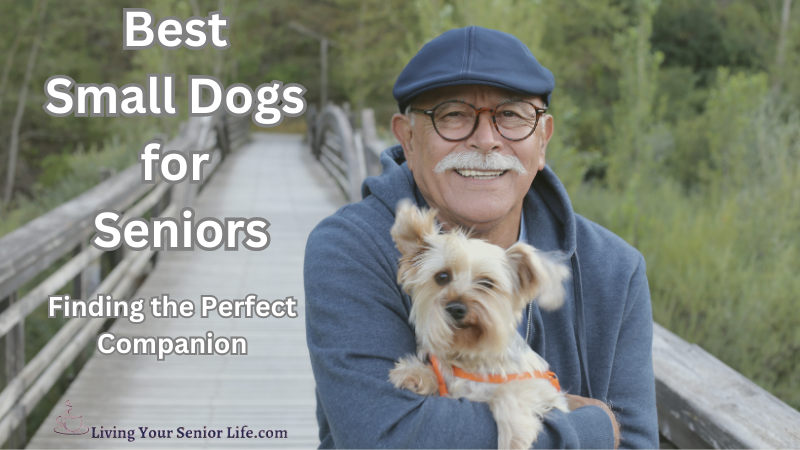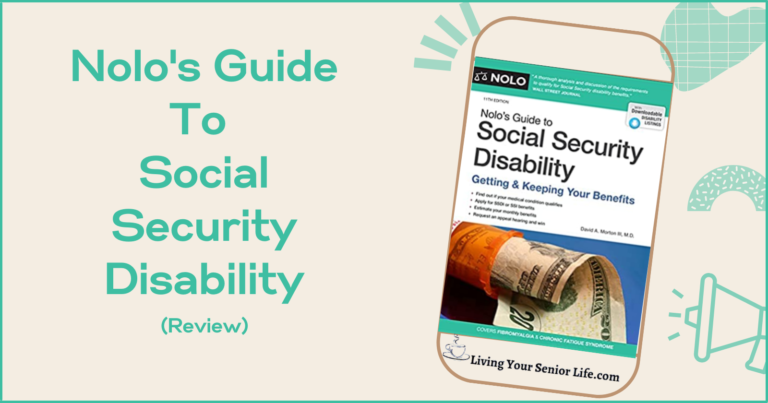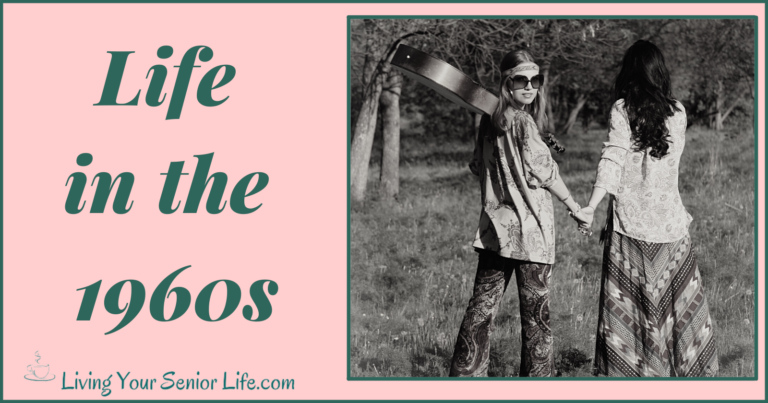As you age, having a loyal and loving companion becomes increasingly important. Small dogs make great companions for seniors due to their size, exercise needs, and affectionate nature. In this guide, Best Small Dogs For Seniors, we’ll explore the best small dog breeds for seniors, taking into consideration their temperament, energy levels, and overall suitability. We’ll cover factors to consider when choosing a small dog, how to find your perfect match, and tips for caring for your furry friend. We will also answer frequently asked questions about small dogs for seniors.
Whether you are an active senior looking for a hiking buddy or prefer a calm lapdog, there is a small dog out there that is just right for you.
Key Takeaways:
- Small dogs provide older adults with love, joy, and a strong bond, enhancing their daily lives.
- The right small dog breed offers a good match in energy, size, and temperament, catering to a senior’s specific lifestyle and preferences.
- Proper care, including daily exercise and regular grooming, is essential to maintain the health and happiness of small dog breeds.
Video: Best Small Dogs for Seniors
Top Small Dog Breeds for Seniors
If you’re a senior looking for a small dog breed that is well-suited for your lifestyle, you’re in luck. There are several breeds that possess traits that make them excellent companions. These dogs provide emotional support, companionship, and can help seniors maintain an active lifestyle.
The best companion dogs for seniors are typically breeds that possess a calm and gentle temperament, as well as a lower energy level. These dogs provide emotional support, companionship, and can help seniors maintain an active lifestyle. One such breed is the Cavalier King Charles Spaniel, known for their friendly nature and adaptability to different living situations. Another suitable option is the Bichon Frise, a small breed that is affectionate, sociable, and easy to train. Additionally, the Shih Tzu is an ideal choice due to their loving nature and relatively low exercise requirements. These breeds are often recommended as the best companion dogs for seniors in English.
Breed 1: The Gracious Cavalier King Charles Spaniel
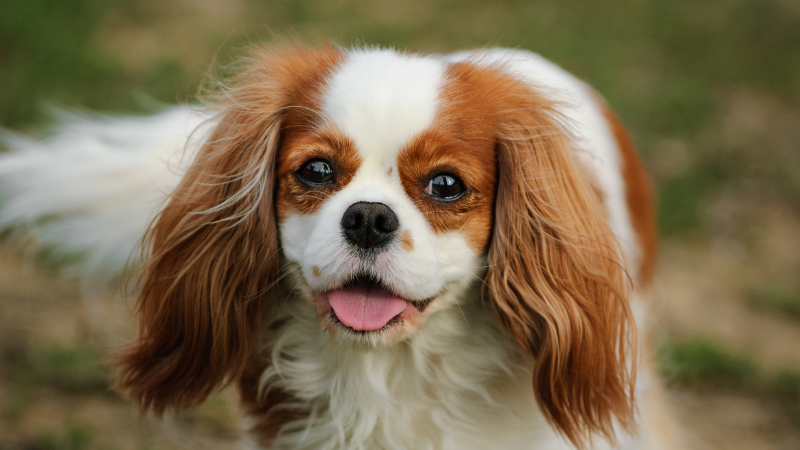
The Cavalier King Charles Spaniel is a wonderful small breed for seniors. With their friendly and affectionate nature, they make loyal companions. They are known for their adaptability, getting along well with other pets and people. Cavaliers are moderately energetic, enjoying leisurely walks and playtime in the yard. Their long, silky coat requires regular brushing, but their overall grooming needs are manageable.
| Breed Features |
|---|
| Temperament: Affectionate, good with children and other dogs. |
| Energy Level: Moderate |
| Exercise Needs: Moderate |
| Grooming Needs: Regular brushing and an occasional bath. |
| Size: Height: 12″-13″; Weight: 13-18 lbs |
| Lifespan: 12-15 years |
Breed 2: The Joyful Bichon Frise
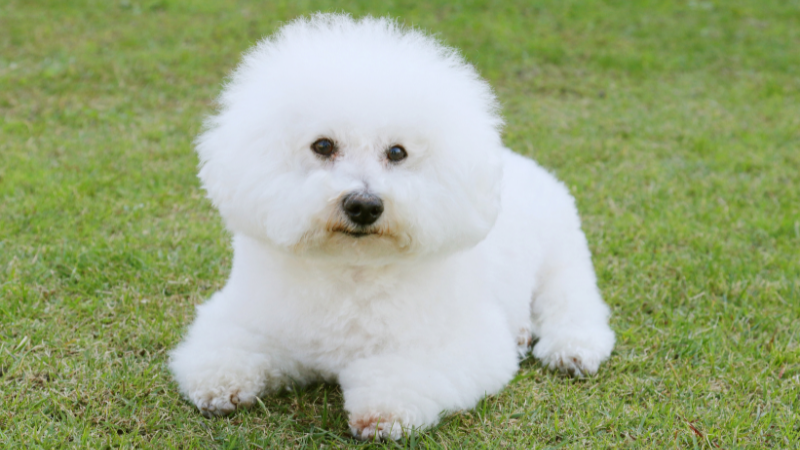
The Bichon Frise is a charming small dog that brings joy to any home. The Bichon stands out as a bubbly ball of fluff, radiating positive energy that resonates well with older people seeking a cheerful furry friend. Bichons are known for their low-shedding coat, which is hypoallergenic, making them suitable for individuals with allergies. However, because of their plush coat, they do require consistent grooming. They thrive on human companionship and don’t require extensive exercise, making them an excellent choice for seniors looking for a loving lap dog.
| Breed Features |
|---|
| Temperament: Affectionate, good with children and other dogs. |
| Energy Level: High |
| Exercise Needs: Moderate |
| Grooming Needs: High |
| Size: Height 9.5″-11.5″; Weight 12-18 lbs |
| Grooming Needs: High |
Breed 3: The Devoted Shih Tzu
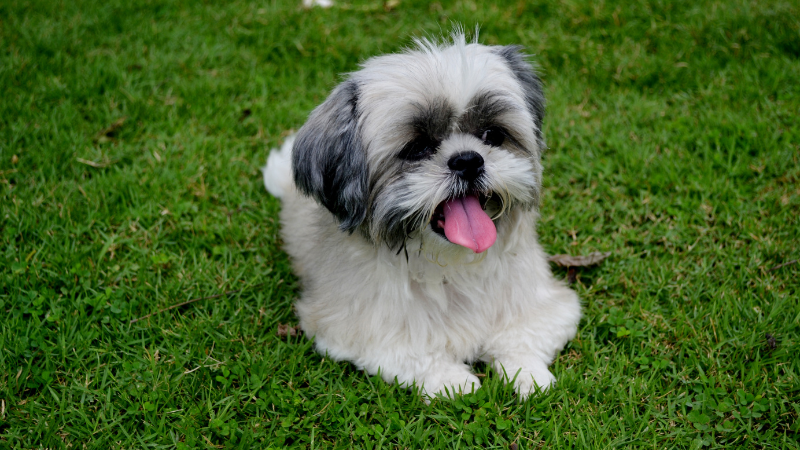
The Shih Tzu, with their noble heritage, serves as a marvelous canine companion, particularly well-adapted to living with senior citizens. Their gentle nature makes them top therapy dogs and intimate companions. Ideal for small apartments, these dogs are comfortable with minimal exercise, yet they will always relish a brisk walk with their owner. The regality of their long coat does demand daily brushing, but this routine grooming can forge a strong bond between pet and owner, enhancing the emotional benefits of dog ownership.
| Breed Features |
|---|
| Temperament: Affectionate, good with children and other dogs. |
| Energy Level: Low |
| Exercise Needs: Low |
| Grooming Needs: High |
| Size: Height 9″-10.5″; Weight 9-16 lbs |
| Lifespan: 10-18 years |
Within the tapestry of dog breeds that grace our lives, these three breeds — the Cavalier King Charles Spaniel, the Bichon Frise, and the Shih Tzu — emerge as particularly endearing choices for seniors. Their sizes and temperaments align perfectly with the needs and capabilities of older individuals. More than just pets, they serve as a source of unconditional love, radiant joy, and unwavering companionship, making the most of every shared moment. Whether it’s through their gentle nature, their ability to adapt to short walks, or the comfort of their daily presence, these breeds can greatly enhance the quality of life for senior dog owners. In choosing one of these faithful companions, seniors can secure a friend that is indeed best in class — a perfect match for their lifestyle and a joyous embodiment of easy companionship.
Finding Your Perfect Match
Factors to Consider
As a senior, choosing a small dog as your companion can be a great decision. However, before making a choice, there are several factors you should consider to ensure that your furry friend is a good match for your lifestyle. Let’s take a closer look at these considerations to help you make an informed decision:
Size and Weight
When selecting a companion pet, consider dogs of a small stature. These companions are not only easier to manage due to their small size, but also ideal for older adults with potential mobility limitations. Opting for a Shih Tzu or a Bichon Frise, for instance, provides the comfort of a lap dog without the challenge of handling a larger breed.
- Weight range: Often under 15 lbs., ideal for easy handling
- Breed examples: Yorkshire Terrier, Cavalier King Charles Spaniel
Energy Level
The energy level of the dog you’re considering is another important factor to consider. As a senior, you might prefer a dog that is not too high-energy or demanding in terms of exercise. Opting for a dog with a moderate energy level will ensure that you can enjoy its company without feeling overwhelmed by exercise requirements.
Consider the exercise needs of the dog breed you’re interested in. Some breeds require more exercise than others. Opting for a breed that needs moderate exercise is an excellent choice for seniors who want to keep active without overexerting themselves.
Temperament
A pet’s nature is pivotal. Aim for breeds lauded for their gentle nature and sociability, such as the always-affectionate Cocker Spaniel. Ideal companions exude a friendly demeanor, ensuring they are wonderful companions for their senior owners.
- Desirable qualities: Sociable, patient, affectionate dog
- Suggested breeds: Bichon Frise, Pembroke Welsh Corgi
Trainability
Choosing a dog that is easy to train and obedient is important for seniors. Look for breeds known for their intelligence and eagerness to please. A dog that responds well to training will make your life easier and enhance the bond between you and your furry friend.
Consider the training needs of the dog breed you’re interested in. Some breeds are easier to train than others. Opting for a breed that is easy to potty train and has moderate exercise needs is an excellent choice for seniors who want a low-maintenance dog.
An intelligent dog like the Miniature Schnauzer can be a pleasure to train. Opting for breeds that are receptive and can form a strong bond through training is advantageous, fostering easy companionship.
- Attributes to look for: Obedience, trainability
- Breed to consider: Miniature Poodle
Health and Grooming
Consider the health and grooming needs of the dog breed you’re interested in. Opting for a breed with minimal health issues and grooming requirements can save you time, effort, and potential expenses. It’s important to choose a dog that fits well with your lifestyle and doesn’t require excessive medical care or grooming maintenance.
Consider the lifespan of the dog breed you’re interested in. Some breeds live longer than others. Opting for a breed with a longer lifespan can ensure that you and your furry friend have many happy years together.
Maintenance plays a crucial role in the ease of dog ownership. Breeds with a short coat, such as the Boston Terrier, often require less grooming, while those with minimal health concerns, like many smaller breeds, minimize future hardships.
- Health considerations: Longevity, predisposition to health problems
- Grooming needs: Regular grooming vs. low maintenance options like the French Bulldog
| Breed | Grooming Needs | Typical Health Concerns |
|---|---|---|
| Shih Tzu | Daily brushing | Eye issues, respiratory |
| French Bulldog | Minimal, short coat | Breathing issues, joint diseases |
To find the perfect small dog breed for you as a senior, consider the following tips:
Assessing Lifestyle and Activity Level
When searching for the perfect small dog breed, it’s crucial to assess your lifestyle and activity level to determine which breed will be the best fit. If you’re an active senior who enjoys regular walks and outdoor activities, you may opt for a slightly more energetic breed. However, if you prefer a quieter lifestyle, a lower-energy breed may be more suitable.
Consider the following factors when evaluating your lifestyle and activity level:
- Exercise Frequency: Are you looking for a furry friend to accompany you on a brisk walk or prefer a companion for short strolls?
- Physical Abilities: Are there limitations you should consider that might influence your ability to care for an energetic dog?
- Time for Training: How much of your day can you dedicate to the consistent training and mental stimulation your dog will need?
Considering Allergies and Shedding
If you have allergies or prefer a dog with minimal shedding, hypoallergenic or low-shedding breeds are a great option. Breeds such as the Bichon Frise or Shih Tzu are less likely to trigger allergies and require less maintenance when it comes to cleaning up pet hair.
When considering allergies and shedding, keep the following in mind:
- Allergies: Consider getting tested for allergies to determine if you’re allergic to dogs or specific breeds.
- Shedding: Determine how much time you’re willing to devote to grooming and cleaning up pet hair.
Exploring Adoption and Rescue Options
Adopting a small dog from a shelter or rescue organization can be a fulfilling experience. Many wonderful dogs are in need of loving homes, and by adopting, you’re providing a second chance to a deserving dog while gaining a loyal companion.
Shelters and rescue organizations are filled with mixed breeds and purebreds alike looking for their forever homes, including mature dogs that have outgrown the puppy stage and may already be potty trained.
When considering adoption and rescue options, keep the following in mind:
- Adoption fees: Determine how much you’re willing to spend on adoption fees and initial vet care.
- Age: Consider adopting an adult dog, as they tend to be calmer and require less training than puppies.
- Lifestyle considerations: Ensure that the dog you adopt is a good fit for your lifestyle and activity level.
Meeting the Dog
Before settling in with a new canine companion, arranging a personal meeting is crucial. This helps in understanding if the dog’s activity level, size, and temperament are indeed a good match. Nothing compares to first-hand experience to feel out if you’ll share that strong bond and are able to offer easy companionship to each other in your golden years.
- Observing Temperament: Is the dog’s personality congruent with your routine and temperament?
- Validating Compatibility: Will this dog likely become my best friend, offering loyalty and unconditional love while fitting seamlessly into my living space and lifestyle?
In the end, the right dog breed will depend on an honest evaluation of my lifestyle, physical capabilities, and personal preferences. Choosing wisely ensures
Caring for Your Small Dog
Once you’ve found the perfect small dog companion, it’s essential to provide them with proper care. Consider the following tips for ensuring their well-being:
As a responsible pet owner, it’s essential to provide your small dog with proper care. Here are some tips to help ensure their well-being:
Nutrition and Feeding
Consult with your veterinarian to determine the best diet and feeding schedule for your small dog. Small breeds may have specific dietary requirements, and proper nutrition is essential for their overall health and longevity. Ensure that you provide your small dog with fresh, clean water at all times.
Exercise and Mental Stimulation
Small dogs may require less exercise compared to larger breeds, but regular physical activity and mental stimulation are still essential. Short walks, interactive toys, and play sessions can help keep your small dog happy and healthy. Always supervise your small dog during playtime to ensure their safety.
Grooming and Hygiene
Follow a regular grooming routine for your small dog. This includes brushing their coat, cleaning their ears, trimming their nails, and brushing their teeth regularly. Good hygiene practices will contribute to their overall well-being. Consider investing in a dog grooming vacuum to make the process easier and more efficient.
Read: Best Dog Grooming Vacuums
Veterinary Care
Schedule regular check-ups with your veterinarian to monitor your small dog’s health. Vaccinations, preventive treatments for parasites, and dental care are essential to maintain their overall health and prevent potential health issues. Consider purchasing pet insurance to help cover the cost of unexpected veterinary expenses.
Safety Considerations
Ensure your home is safe for your small dog. Secure any potential hazards, provide a comfortable bed or resting area, and keep toxic substances out of reach. Small dogs may be more prone to accidents, so take extra precautions to keep them safe. Remember that owning a small dog is a responsibility, and it’s essential to provide them with the care and attention they need to thrive.
Frequently Asked Questions
As seniors consider adding a small dog to their lives, they often have questions regarding the best breeds, care, and compatibility. Here are some frequently asked questions about small dogs for seniors:
Are small dogs suitable for seniors with limited mobility?
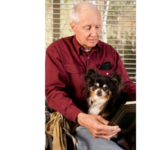
Yes, small dogs are an excellent choice for seniors with limited mobility. They are easier to handle and care for compared to larger breeds, making them ideal companions for seniors. Small dog breeds such as the Chihuahua, Pomeranian, and Pekingese have a calm and gentle temperament, which makes them great emotional support dogs for seniors seeking comfort and support.
Which small dog breeds are known for being hypoallergenic?

If allergies are a concern, several small dog breeds are considered hypoallergenic or have low-shedding coats. These breeds produce fewer allergens, making them ideal for seniors with allergies. The Bichon Frise, Shih Tzu, and Maltese are known for their hair-like coats, which reduce the amount of dander they release into the environment. Other hypoallergenic small dog breeds include the Havanese, Yorkshire Terrier, and Toy Poodle.
How can I ensure the safety of my small dog as a senior?

As a senior, it is important to take several steps to ensure the safety of your small dog. Firstly, create a secure environment within your home by removing potential hazards and keeping toxic substances out of reach. Secondly, provide regular veterinary care, including vaccinations and preventive treatments for parasites. Lastly, be cautious when taking your small dog outside, using a leash or harness to prevent accidents or escapes.
Additional Reading
Conclusion
In conclusion, choosing the right small dog as a senior can greatly enhance your quality of life. Small dogs are perfect companions for seniors because of their size, exercise needs, and affectionate nature. From Chihuahuas to Pugs, there are a variety of small dog breeds that make great pets for seniors. When choosing a small dog breed, consider factors such as temperament, energy level, and grooming needs. It’s important to find a small dog breed that perfectly suits your lifestyle to ensure a long and happy companionship. By embracing the wonders of senior living with the perfect small dog by your side, you can enjoy abundant happiness and fulfillment. So, what are you waiting for? Find your loyal and loving friend today!
What are your top choices for the best small dogs for seniors? Do you have a favorite breed of small dog? Please comment below.
